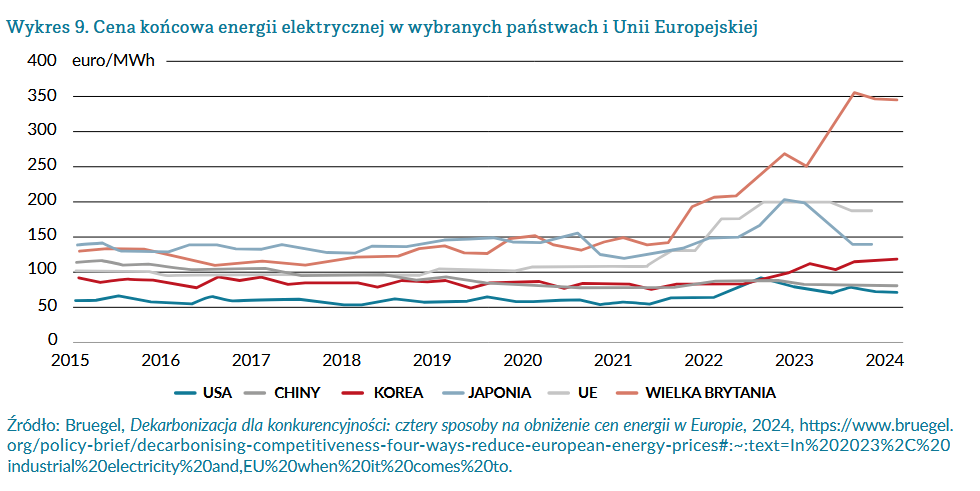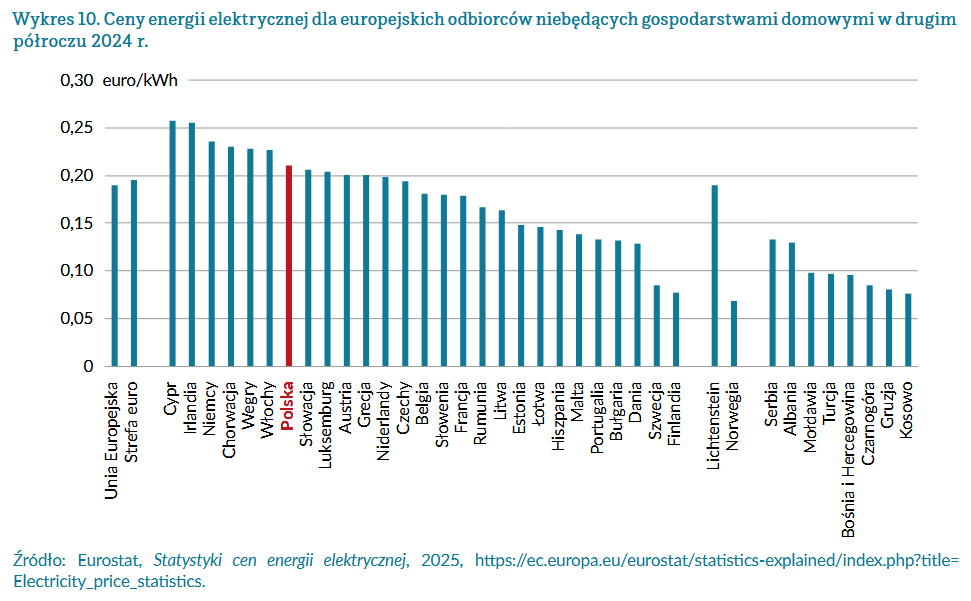A desperate cry for help. Tens of thousands of jobs at risk

- Industry representatives warn that without urgent decisions to reduce energy prices, energy-intensive industries in Poland and Europe will not survive.
- The EU, in order to curb energy prices in the short term, is focusing on increasing LNG imports from the US. According to critics, this means becoming dependent on yet another supplier and abandoning climate goals.
- Experts also believe that some of the EC's ideas are untested. At the same time, they call for reform of the energy market, development of renewable energy sources and increasing the flexibility of the system.
- ArcelorMittal employs around 10,000 people in Poland. We are proud to be investing here, but believe me - if the energy transformation continues at the same pace as in recent years, the energy-intensive industry will have a problem surviving. Everything we have talked about must pick up the pace. When it comes to energy-intensive industries, we are at a crossroads. We have one year left, maybe two, maybe three, but no more. Believe me - warned Wojciech Koszuta, president of ArcelorMittal Poland, during the European Economic Congress.
ArcelorMittal Poland is the largest steel producer in Poland, with plants in the Silesian, Lesser Poland and Opole provinces. In 2023, the company invested PLN 720 million in Poland, and in 2024, approximately PLN 500 million. - This shows that we do not want to withdraw from Poland or Europe. But we need decisions that will be quick and that will not actually change the situation - warned the president.
Elżbieta Rozmus, a member of the board of the Chamber of Industrial Energy and Energy Consumers, said that we currently pay 3-4 times more for energy than our competitors from China, the USA, India , but also from those economies that have not introduced such radical environmental solutions.
In such a situation, the European industry, not to mention the Polish one, which operates in the specifics of the energy mix and a high-emission one at that, has no chance of survival. We hear about sectors that are leaving the EU. There are more and more problems related to maintaining production and competitiveness - she emphasized.
The energy-intensive industry, which is struggling with high energy prices, is therefore saying clearly: we need fast and effective action, because ultimately we will lose the competition to companies from Asia and the US. And they are quite right about this. The Energy Forum report "Anatomy of high energy prices and a recipe for the future" shows that electricity prices in the EU significantly exceed the rates in China, the US or South Korea.

In Poland, energy for industry is among the most expensive in the EU. " Nearly 40% of energy prices are taxes and fees for industrial recipients in Poland. Some of them use compensation, reducing energy costs by the cost of CO2 emissions, in order to compete with companies from outside the EU that are not covered by the ETS2 system," we read.

The problem has been noticed by the European Commission, which, as part of the Clean Industrial Deal, has presented a plan to reduce energy prices in the EU . It is to reduce energy bills by up to €260 billion per year by 2040. The plan lists several areas of action, including:
- reducing energy bills - new solutions are intended to make it easier for consumers to switch energy suppliers to cheaper ones that offer cleaner energy sources;
- reducing the costs of energy supply – including by implementing long-term supply contracts and shortening the time required to issue permits for renewable energy sources and energy infrastructure, and further integrating the energy market;
- supporting energy efficiency by facilitating consumer access to more efficient and long-lasting appliances;
- regulation of gas prices in the EU, inter alia, by controlling gas markets;
- ensuring affordable energy for businesses by greater engagement with the energy industry, clean energy producers and the public sector;
- Completing the Energy Union, including expanding interconnections and strengthening networks and cross-border trade;
- Better preparation of the EU for crises - the EC has committed to updating EU energy rules to take into account emerging threats such as cyberattacks, attacks on critical infrastructure, acts of sabotage or pressure from exporters.
The problem is that these actions may bring the expected effect in a few years at the earliest, and the industry needs support here and now. So what can the European Union do to achieve a short-term effect? As a person close to the European Commission told us, the source of energy that influences electricity prices in Europe is gas. - At some point, especially after Russia's invasion of Ukraine, there was a slight shortage of this gas, which drove up prices - she explained.
She added that the EC has high hopes for the United States, which is building new LNG terminals on the east coast. - These terminals will be completed in the next two or three years, so much more gas will actually flow to Europe then, which should result in a significant reduction in energy prices - she emphasized.
Desperate cry for help. Industry will struggle to surviveRecall that the US is the world's largest LNG exporter and has played a key role in supplying Europe since the Russian invasion of Ukraine in 2022. "Supplies from the US will continue to increase significantly. There are a lot of talks about contracts. We will definitely see more contracts for LNG from the US to Europe," US Energy Secretary Chris Wright told Reuters.
It turns out that it will not end with long-term contracts for liquefied natural gas (LNG). The EU also wants to support gas investments in the US . This move seems, on the one hand, to be a move aimed at reducing energy prices on the Old Continent, but it is also a concession to pressure from the Donald Trump administration, which threatened to impose tariffs if the EU does not increase purchases of American LNG.
However, there are allegations that these actions undermine the EU's goals in terms of energy security (the EU is becoming dependent on yet another supplier) and climate protection. According to experts, American LNG - mostly derived from shale gas - has a carbon footprint 33 percent larger than coal after taking into account methane emissions throughout the supply chain.
This plan does not promote energy affordability or security – it bows to pressure from the Trump administration and plays into the hands of the fossil fuel industry. By investing in American LNG as a replacement for Russian gas, the EU is replacing one expensive, polluting and unstable energy source with another. These investments will lock Europe into volatile energy prices for decades and undermine our climate goals, said Laurie van der Burg, head of the public finance program at Oil Change International.
She adds that it is also a step backward in limiting the financing of fossil fuels in the world. - This plan should not come true. The EU should focus on real solutions: investments in renewable energy sources, energy efficiency and moving away from fossil fuels - emphasizes the expert.
What does the European Commission have to say about this? - We have no other choice and this gas will be needed as a transitional source. At the same time, we will be expanding our own renewable energy sources, energy storage facilities, and also modernizing transmission networks and energy interconnectors. How long will this transitional period last? I hope not as long as everyone thinks - we heard in Brussels.
Maciej Burny, president of the consulting company ENERXperience, commenting on the EC plan in an interview with WNP, pointed out that it lacks a concept for entering gas extraction, which would reduce dependence on imports , through access to one's own deposits. - Of course, these would be actions of individual companies, but the EU could probably support them, as it does, for example, in the case of aggregating demand and purchasing this raw material through a common EU platform - he said.
The EU has an idea for electricity prices. What does the industry say about it?There is also the question of whether focusing on American gas will allow for a significant enough reduction in energy prices to make them attractive to industry. According to an industry insider who wishes to remain anonymous, the proposals that appear in the EU every now and then are untested and unrealistic. - What guarantees does the European Commission have that this gas will arrive? Does it have signed agreements? This is all ridiculous - we hear.
What then should be done to reduce energy prices for both industry and households?
According to Elżbieta Rozmus , the provisions of climate policy should be revised , but also the focus should be on industrial policy , taking into account the needs of industry.
Without industry, we will not have a European economy. We are aware that transformation is necessary and we participate in it as entrepreneurs and citizens, but this cannot be a path to nowhere - she emphasized.
She also pointed out that the projects currently being processed in the EU do not assume abandoning or even relaxing the adopted assumptions. - The EC did not draw conclusions from what happened after the energy crises related to the war in Ukraine or the Middle East - she summed up during the EKG.
According to the authors of the Energy Forum report, higher prices for Polish industry compared to other countries are the result of state policy, which reduces fees for households at the expense of industry. "In simple terms, households in Poland receive relatively low bills, because part of the fees are borne by industry. The opposite is true in most European countries, where industry is exempt from many fees borne by households. This is related to the economic situation of households, but also to support mechanisms for vulnerable recipients," the experts noted.
However, there are no easy and quick ways to reduce prices. According to experts, the key factors include:
- capacity market reform,
- increasing the share of cheap renewable energy sources (especially wind farms),
- improving system flexibility,
- development of energy sources and storage in homes and companies.
"At the same time, it is necessary to introduce dynamic distribution tariffs, reduce taxes and replace ineffective price freezing with targeted aid, e.g. an energy voucher financed by the ETS. In the long term, better integration with the European energy market and coordinated infrastructure planning at the EU level will also be necessary, " we read in the report.
Joanna Pandera, president of the Energy Forum, believes that Poland does not have to wait for EU decisions. - It is necessary to restore the stock exchange obligation, which will increase market transparency, and ensure fair competition by facilitating access to the network for private investors and limiting the privileges of state-owned companies. This requires a strong analytical base in public administration, enabling decisions based on data, not ad hoc political calculations - she emphasized.
wnp.pl





